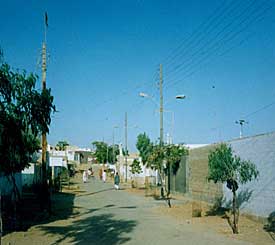Orangi Low-Cost Housing Programme, Karachi

The Orangi Pilot Project is known as one of the most successful NGO sanitation provision programmes. This community-owned, community-managed infrastructure upgrading programme has helped over one million people improve their sanitation since it was started in 1980 by Dr Akhtar Hameed Khan, a renowned Pakistani social scientist. He established the Orangi Pilot Project as a research institution whose objective was to analyse the problems of the Orangi settlement and then through action research and extension education to discover viable solutions. Its strategy has always been to help local people achieve their own development needs rather than rely on external sources of aid.
The methods used include identifying local activists, providing training in community organisation and technical support, providing on-going support and guidance for the actual improvement work and simplifying designs so that they are affordable. The emphasis is on encouraging professionals and governments to support the people's initiatives. Over the lifetime of the programme the residents of Orangi have installed 1,300,000 feet of underground piped sanitation and 91,000 dwellings have individual indoor toilets as a result of the project.
In 1986, having seen the success of the sanitation programme, OPP -RTI (Research and Training Institute) initiated a housing programme using the same research and action approach. Research was carried out in conjunction with the University of Karachi and the Dawood College and this established that almost all of the houses in the Orangi squatter settlement were substandard. This was due to a variety of factors, including :-
The poor quality of building materials used in construction. The hand-made concrete blocks which were the traditional main components of the walls and foundations were substandard due to the use of poor quality materials and construction methods. Severe cracks had therefore developed in the main structural components of the dwellings.
Building skills were inadequate. Faulty construction techniques were used due to ignorance, as well as the quick-fix attitude of masons and residents.
The inequitable relationship between contractor and mason and the house owner.
Poor ventilation in the houses.
Having spent two years researching the housing problems and their causes, OPP- RTI developed an action research programme to develop pilot solutions to these problems. The work carried out included:-
Upgrading the building component manufacturing yards in the Orangi settlement of Karachi to improve the quality of the concrete blocks available for construction and by introducing the manufacture of alternative roofing components.
Evolving standard construction designs and techniques and training masons to use them, as well as providing accurate plans and estimates.
Preparing standardised steel shutterings and lending these and other tools and equipment to local communities.
Preparing audio-visual aids, manuals and instruction sheets that can be easily understood by the local population.
Owners of building component yards were persuaded to participate in the research and development of improved building materials and to manufacture the improved quality bricks using a simple machine. An improved ratio of concrete mix was identified and the compaction, vibration, curing and drying process was streamlined. This has enabled the blocks to be four times stronger than previously, without any increase in price. This is due to the increased production from mechanisation (on average from 750 blocks to 2,500 blocks a day). The initial research was carried out in 1987 in four yards with OPP-RTI providing a loan and technical support. All 57 building component yards in the Orangi area have adopted these methods and Orangi has now become a centre for the production of mechanised blocks in Karachi. Overall employment in the block producing sector has increased and earnings have increased by at least 50 per cent and in some cases by 200 per cent. Thirty to forty per cent of the blocks now being made in Orangi are exported to neighbouring areas.
Ninety-six local masons have been trained in the improved design and construction techniques and the better use of tools and they in their turn are training their apprentices. Accurate plans and estimates have been provided for the masons and tools and shutterings were lent to carry out the work. A new load bearing technology for construction has been developed that is only one third of the cost of the reinforced concrete construction. It includes in-situ foundations for a minimum of ground floor plus first floor, 6 inch load-bearing walls of machine made blocks, batten-tile or T-girder roofing and proper fixing methods, a pre-cast staircase, proper orientation and ventilation. Over 4,000 houses are built annually with these improved blocks and construction systems.
The lack of proper ventilation is a recurring problem in houses and schools. Through the use of on-site guidance, leaflets, posters, meetings with masons and house owners, the importance of ventilation is being emphasised.
Local young people have been trained as para-architects to provide technical support and advice to local households, community builders and small building contractors, since existing architectural practices were unwilling to undertake this work. The first team of two para-architects has established an office in Orangi and have developed a substantial clientele. Young people from the community are also being trained in surveying and mapping at OPP-RTI and will be able to help neighbourhoods in the mapping of their settlements when the time comes for regularisation of their area by the local government.
Approximately 96,000 houses have been covered by the work of the OPP-RTI sanitation programmes. Once the streets have been made clean and wholesome with the introduction of piped underground sanitation, the local people are prepared to invest their own resources in improving their housing conditions and it is estimated that Rs 100,000 ($1,750) is spent by each family on their home once the environmental improvement works have been completed.
Funding for core administration costs of the organisation is met by a Pakistani Foundation, with additional funds provided for additional training and education programmes provided by international donors. All costs are kept to a minimum. The credit-programme has reserves of Rs230m ($4m) The cost of actually carrying out the sanitation improvements are met by the communities, with local community leaders organising all the financing for the collective works. To date over Rs 82m ($1,435,000) has been invested by the local communities in the sanitation improvements. Individual households meet the cost of improving their own dwellings.
In addition to the improvements to the sanitation system and housing in Orangi, the programme has supported the position of women in the communities by encouraging their participation in the community development process, has established an education programme and supported the health and micro-credit programmes. There has been an improvement in the health of the residents, a substantial reduction in infant mortality rates and an increase in disposable income.
The OPP-RTI community-based approach to sanitation, environmental and housing improvement developed in Orangi have been used in many other slum settlements of Karachi and in seven other cities of Pakistan. Training is provided to NGO staff, CBO activists and their government counterparts at the OPP-RTI office in Karachi and OPP-RTI staff carry out site visits and monitor the work. These CBOs are now taking the initiative in additional activities dealing with solid waste management, education etc.
It is estimated that over 4 million people have benefited from the replication of the process. The national government has agreed to support the OPP-RTI model and is increasingly supportive of the approach, which is being widely used by international agencies and donor organisations. The approach has also been widely used elsewhere in the world with training provided to persons from Nepal, Cambodia, Vietnam, Central Asia, South Africa and Sri Lanka.
For further information please contact Dr Perween Rahman
Orangi Pilot Project - Research and Training Institute (OPP-RTI)
St - 4, Sector - 5/A
Qasba Colony
Manghopie Road
Karachi 75800
PAKISTAN
| Tel: | + 92 21 665 2297
| | Fax: | + 92 21 666 5696 | | Email: | opprti@digicom.net.pk | |
|

